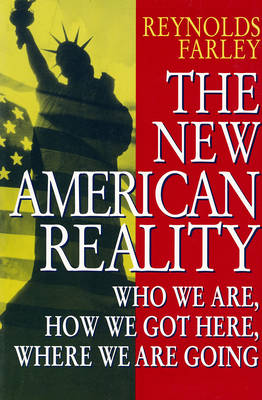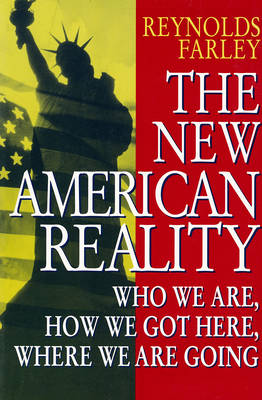
Bedankt voor het vertrouwen het afgelopen jaar! Om jou te bedanken bieden we GRATIS verzending (in België) aan op alles gedurende de hele maand januari.
- Afhalen na 1 uur in een winkel met voorraad
- In januari gratis thuislevering in België
- Ruim aanbod met 7 miljoen producten
Bedankt voor het vertrouwen het afgelopen jaar! Om jou te bedanken bieden we GRATIS verzending (in België) aan op alles gedurende de hele maand januari.
- Afhalen na 1 uur in een winkel met voorraad
- In januari gratis thuislevering in België
- Ruim aanbod met 7 miljoen producten
Zoeken
The New American Reality
Who We Are, How We Got Here, Where We Are Going
Reynolds Farley
Paperback | Engels
€ 43,95
+ 87 punten
Omschrijving
"A fascinating and authoritative account of American social history since 1960 as viewed through the prism of government statistics....[Farley] uses publicly available data, straight forward methods, and modest...language, to provide more information and insight about recent social trends than any other volume in print." --American Journal of Sociology "A brilliant piece of work. Farley is absolutely masterful at taking tens of thousands of national survey statistics and weaving from them a fascinating and beautifully illustrated tapestry of who we are." --Barry Bluestone, Frank L. Boyden Professor of Political Economy, University of Massachusetts, Boston The New American Reality presents a compelling portrait of an America strikingly different from what it was just forty years ago.Gone is the idealized vision of a two-parent, father-supported Ozzie and Harriet society. In its place is an America of varied races andethnic backgrounds, where families take on many forms and mothers frequently work outside the home. Drawing on a definitive analysis of the past four U.S. censuses, author Reynolds Farley reveals a country that offers new opportunities for a broader spectrum of people, while at the same time generating frustration and apprehension for many who once thought their futures secure. The trends that have so transformed the nation were kindled in the 1960s, a watershed period during which many Americans redefined their attitudes toward the rights of women and blacks. The New American Reality describes the activism, federal policymaking, and legal victories that eliminated overtracial and sexual discrimination. But along with open doors came new challenges. Divorce and out-of-wedlock births grew commonplace, forcing more women to raise children alone and--despite improved wages--increasing their chances of falling into poverty. Residential segregation, inadequate schooling, and a particularly high ratio of female-headed families severely impaired the economic progress of African Americans, many of whom were left behind in declining central cities as businesses migrated to suburbs. A new generation of immigrants from many nations joined the ranks of those working to support families and improve their prospects, and rapidly transformed the nation's ethnic composition. In the 1970s, unprecedented economic restructuring on a global scale created unexpected setbacks for the middle class. The long era of postwar prosperity ended as the nation's dominant industry shifted from manufacturing to services, competition from foreign producers increased, interest rates rose, and a new emphasis on technology and cost-cutting created a demand for more sophisticated skills in the workplace. The economic recovery of the 1980s generated greater prosperity for the well-educated and highly skilled, and created many low paying jobs, but offered little to remedy the stagnant and declining wages of the middle class. Income inequalitybecame a defining feature in the economic life of America: overall, the rich got richer while the poor and middle class found it increasingly difficult to meet their financial demands. The New American Reality reports some good news about America. Our lives are longer and healthier, the elderly are much better off than ever before, consumer spending power has increased, and minorities and women have many more opportunities. But this book does not shy away from the significant problems facing large portions of the population, and provides a valuable perspective on efforts to remedy them. The New American Reality offers the information necessary to understandthe critical trends affecting America today, from how we earn a living to how and when we form families, where we live, and whether or not we will continue to prosper. A Volume in the Russell Sage Founadtion Census Series
Specificaties
Betrokkenen
- Auteur(s):
- Uitgeverij:
Inhoud
- Aantal bladzijden:
- 395
- Taal:
- Engels
Eigenschappen
- Productcode (EAN):
- 9780871542397
- Verschijningsdatum:
- 11/06/1998
- Uitvoering:
- Paperback
- Formaat:
- Trade paperback (VS)
- Afmetingen:
- 152 mm x 229 mm

Alleen bij Standaard Boekhandel
+ 87 punten op je klantenkaart van Standaard Boekhandel
Beoordelingen
We publiceren alleen reviews die voldoen aan de voorwaarden voor reviews. Bekijk onze voorwaarden voor reviews.









